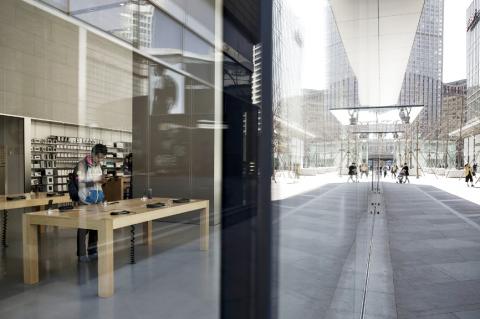A Beijing court has overturned a ruling that Apple Inc’s iPhone 6 violated a Chinese manufacturer’s patent which saw the US tech giant ordered to cease selling the smartphone in China.
The Beijing Intellectual Property Office in May last year had ruled that Apple violated design patents of Chinese maker Shenzhen Baili (深圳佰利) with its iPhone 6 and iPhone 6 Plus, and would be barred from selling those models.
Sales were not suspended while Apple appealed against the administrative order.

Photo: Bloomberg
The Intellectual Property Court in Beijing on Friday ruled in favor of the California-based firm.
The court “quashes the decision of the bureau” and “recognizes that Apple ... has not infringed the design patent filed by the company Shenzhen Baili,” the verdict reported by the state judicial daily Renmin Fayuan Ribao said.
The office, an administrative body of the Beijing municipality, had ruled that the two Apple smartphones infringed a Baili design patent.
It had accused the US firm of having “copied” the exterior design of Baili’s 100C smartphone, which is characterized by a curved edge and rounded corners.
However, the Beijing court ruled that the iPhone 6 had features that “completely change the effect of the entire product ... and both phones are easily distinguishable in the eyes of consumers,” finding Baili’s claim was without legal basis.
When it took on Apple in December 2014, Baili was a promising electronics firm, backed by Chinese Internet giant Baidu Inc (百度), and eager to tap into the telecom boom.
The company has collapsed since then, hit by public criticism of offering products of poor quality and by China’s competitive smartphone market, which has seen many start-ups go under.
Apple has had other intellectual property problems in China. A maker of “iphone” branded leather goods in May last year won a lawsuit filed by Apple as the court ruled Xintong Tiandi (新通天地科技) had registered the word as a trademark in 2007, while Apple smartphones did not officially go on sale in China until 2009.

BYPASSING CHINA TARIFFS: In the first five months of this year, Foxconn sent US$4.4bn of iPhones to the US from India, compared with US$3.7bn in the whole of last year Nearly all the iPhones exported by Foxconn Technology Group (富士康科技集團) from India went to the US between March and last month, customs data showed, far above last year’s average of 50 percent and a clear sign of Apple Inc’s efforts to bypass high US tariffs imposed on China. The numbers, being reported by Reuters for the first time, show that Apple has realigned its India exports to almost exclusively serve the US market, when previously the devices were more widely distributed to nations including the Netherlands and the Czech Republic. During March to last month, Foxconn, known as Hon Hai Precision Industry

Taiwan Semiconductor Manufacturing Co (TSMC, 台積電) and the University of Tokyo (UTokyo) yesterday announced the launch of the TSMC-UTokyo Lab to promote advanced semiconductor research, education and talent development. The lab is TSMC’s first laboratory collaboration with a university outside Taiwan, the company said in a statement. The lab would leverage “the extensive knowledge, experience, and creativity” of both institutions, the company said. It is located in the Asano Section of UTokyo’s Hongo, Tokyo, campus and would be managed by UTokyo faculty, guided by directors from UTokyo and TSMC, the company said. TSMC began working with UTokyo in 2019, resulting in 21 research projects,

Taiwan’s property market is entering a freeze, with mortgage activity across the nation’s six largest cities plummeting in the first quarter, H&B Realty Co (住商不動產) said yesterday, citing mounting pressure on housing demand amid tighter lending rules and regulatory curbs. Mortgage applications in Taipei, New Taipei City, Taoyuan, Taichung, Tainan and Kaohsiung totaled 28,078 from January to March, a sharp 36.3 percent decline from 44,082 in the same period last year, the nation’s largest real-estate brokerage by franchise said, citing data from the Joint Credit Information Center (JCIC, 聯徵中心). “The simultaneous decline across all six cities reflects just how drastically the market

Ashton Hall’s morning routine involves dunking his head in iced Saratoga Spring Water. For the company that sells the bottled water — Hall’s brand of choice for drinking, brushing his teeth and submerging himself — that is fantastic news. “We’re so thankful to this incredible fitness influencer called Ashton Hall,” Saratoga owner Primo Brands Corp’s CEO Robbert Rietbroek said on an earnings call after Hall’s morning routine video went viral. “He really helped put our brand on the map.” Primo Brands, which was not affiliated with Hall when he made his video, is among the increasing number of companies benefiting from influencer